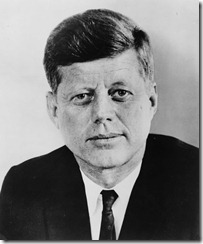50 Years Ago Today: JFK’s Inaugural Address
Fifty years ago today – on January 20, 1961 – John F. Kennedy was sworn in as the 35th President of the United States.
The speech he gave on that snowy day is most famous for this line: “Ask not what your country can do for you – ask what you can do for your country.”
Today, I’ll offer four pointers to help you use his speech to become a more effective speechwriter and public speaker.
If you’ve never seen the speech, you’re in for a treat.
1. Passion Trumps Flaws
What immediately strikes me when listening to this address is Kennedy’s thin voice and strong accent. This should be encouraging to those of you who hate the sound of your own voice, as it proves you don’t have to be blessed with a perfect speaking voice to be an effective public speaker. Kennedy’s emphatic gestures added to his conviction. Like JFK, you can compensate for imperfections by speaking with passion.
2. Pacing Matters
Kennedy’s words are even more powerful since he pauses for a few moments between each thought, allowing the audience to consider them on their own terms. If he rushed the speech, people would have been unable to fully engage with his content; instead, he spoke deliberately and gave each thought its due measure.
You can get a good sense of JFK’s pacing in the above clip by listening to the way he delivers the following words. By pausing after every comma, he imbues each phrase with its full weight (beginning at 2:32):
“Let every nation know…whether it wishes us well or ill…that we shall pay any price, bear any burden, meet any hardship, support any friend, oppose any foe, to assure the survival and the success of liberty.”
3. Terrific Use of Rhetorical Devices
Kennedy used many rhetorical devices during his speech; these three are among the most notable:
Antimetabole: Although President Kennedy deploys many rhetorical devices throughout the speech, none was as memorable as one called antimetabole, in which the same words are used in successive clauses, but in reverse order:
“Ask not what your country can do for you, ask what you can do for your country.”
“Let us never negotiate out of fear. But let us never fear to negotiate.”
Anaphora: Note the repetition of the word “to” at the beginning of six consecutive paragraphs: “To those old allies,” “To those new states,” “To those peoples,” “To our sister republics,” “To that world assembly,” and “Finally, to those nations.” That rhetorical device is known as anaphora, since the repetition occurred at the beginning of each subsequent thought.
Alliteration: This type of phrasing refers to a repeated sound in words, phrases, or sentences. In his last sentence, Kennedy used the phrase, “…let us go forth to lead the land we love,” a terrific use of alliteration.
4. He Ended With a Call To Action
In the final minute of his address, Mr. Kennedy uttered his most famous line: “Ask not what your country can do for you – ask what you can do for your country.” Good speakers everywhere close their talks with some kind of call to action, whether it asks the audience to buy a product, consider an idea, or vote for a candidate.
In this case, Kennedy left his audience with a much more important closing call-to-action – a request that asked Americans to contribute more to the nation than they took from it.
Note: You can see more of JFK’s speeches on the John F. Kennedy Presidential Library and Museum website, at http://www.jfklibrary.org/JFK/Historic-Speeches.aspx. The library recently put many new clips online.



